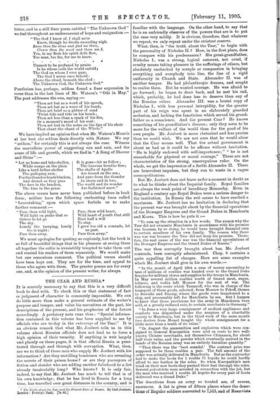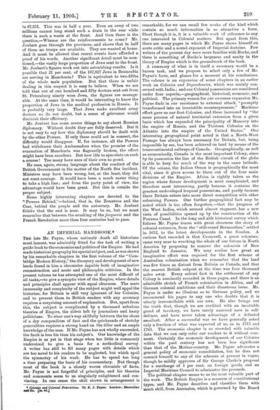IT is scarcely necessary to say that this is a
very difficult book to deal with. To check this or that statement of fact or judgment of character is commonly impossible. We can do little more than make a general estimate of the writer's purpose and temper, and value his narratives of the past, his descriptions of the present, and his prophecies of the future accordingly. A prefatory note runs thus : " Special informa- tion contained in this volume has been supplied to me by officials who are to-day in the entourage of the Tsar." It is an obvious remark that what Mr. Joubert tells us in this volume about Russian officials does not lead us to form a high opinion of their veracity. If anything is writ largely and plainly on these pages, it is that official Russia is pene- trated through and through with corruption. What, then, are we to think of these men who supply Mr. Joubert with his information F Are they unwilling bondsmen who are revealing the secrets of their prison house ? or are they purveyors of fiction and slander who are adding another falsehood to a list already incalculably long P Who knows P It is only fair, indeed, to say that Mr. Joubert has much to tell that is of his own knowledge ; that he has lived in Russia for a long time, has travelled over great distances in the country, and is • The Truth about the Tsar and the Prosent State of Russia. By Carl Joubert.
London : Eveleigh Nub. [7.. 61.]
familiar with the language. On the other band, to say that he is an unfriendly observer of the powers that are is to put the case very mildly. It is obvious, therefore, that whatever
we repeat, we only repeat under the strictest reserve.
What, then, is " the truth about the Tsar," to begin with
the personality of Nicholas II. ? How, in the first place, does he compare with his predecessors ? His great-grandfather, Nicholas I., was a strong, logical autocrat, not cruel, if
cruelty means taking pleasure in the sufferings of others, but absolutely unchecked by scruple or compassion in bringing everything and everybody into line, the line of a rigid uniformity in Church and State. Alexander II. was of another temper. He had philanthropic dreams, and sought to realise them. But he wanted courage. He was afraid to go forward ; he began to draw back, and he met his end, which, probably, he had done less to deserve than any of the Russian rulers. Alexander III. was a brutal copy of Nicholas I., with less personal intrepidity, for the greater part of his reign was spent in an elaborately guarded seclusion, and lacking the fanaticism which served his grand- father as a conscience. And the present Czar ? He knows something of his grandfather's dreams ; only they seem to be more for the welfare of the world than for the good of his
own people. Mr. Joubert is more rhetorical and less precise than we could wish. We are not sure that he would allow that the Czar means well. That the actual government is about as bad as it could be be affirms without hesitation.
" He is highly endowed with self-importance ; " " he is not remarkable for physical or moral courage." These are not characteristics of the strong, unscrupulous ruler. On the whole, we get the impression of a feeble Alexander II. There are benevolent impulses, but they run to waste in a vague cosmopolitanism.
But Mr. Joubert does not leave us for a moment in doubt as to what he thinks about the Imperial family. Royal families are always the weak point of hereditary Monarchy. Even in England a century ago Royal Dukes were a serious danger to the institution. In Russia the evil seems to have reached a maximum. Mr. Joubert has no hesitation in declaring that the present war was brought about by the financial operations of the Dowager Empress and the Grand Dukes in Manchuria and Korea. This is how he puts it :—
" To sum up the situation in a few words. The reason why the Tsar did not evacuate Manchuria in accordance with his promise was because, by so doing, he would have brought financial ruin to certain members of his own family. The reason why there was war was because the Tsar did not keep his promise. There- fore, the real cause of the war was the financial speculations of the Dowager Empress and the Grand Dukes of Russia."
The war thus corruptly brought about has, Mr. Joubert contends, been corruptly administered. Chap. 6 contains a
quite appalling list of charges. Here are some examples which Mr. Joubert shall give in his own words:— "In the month of April 1901 a sum of money amounting to tens of millions of roubles was handed over to the Grand Duke Sergius for military stores and supplies to the troops in Manchuria. In May several million roubles worth of tinned meat, sugar, tobacco, and vodka left Moscow for the seat of war. The following is the route which Tamaroff, who was in charge of the transport of these goods, selected: from Moscow to Pskoff, thence to Suwalki and Danzig, where the goods were transferred to a ship, and presumably left for Manchuria by sea. But I happen to know that those provisions for the army in Manchuria were sold, at a greatly reduced rate, to certain merchants in Germany."
" In June a very large consignment of medical appliances and comforts was despatched under the auspices of a charitable society to Manchuria, but in the third week of the same month two dealers from Memel bought the whole consignment for a little more than a tenth of its value."
"In August the ammunition and explosives which were con- signed to General Kuropatkin were sold en route to two well- known Chinese merchants, not themselves Chinamen, for about half their value, and the powder which eventually arrived in the hands of the Russian army was an entirely harmless quantity."
"Then there was the boot scandal.' The contract price was supposed to be three roubles a pair. The full amount of the order was actually delivered in Manchuria. But as the contractor had to make the boots for 1 rouble 75 kopeks he could hardly afford to use leather in the soles. So when Kuropatkin's men tried on their new boots they pushed their feet through the soles. Several podratchiks were arrested in connection with the job, but the man who received 1 rouble 25 kopeks for every pair of boots delivered was a Grand Duke."
The desertions from an army so treated are, of course, enormous. A list is given of fifteen places where the deser- tions of Regular soldiers amounted to 7,513, and of Reservists
to 67,351. This was in half a year. Even an army of two millions cannot long stand such a drain in the rear while there is such a waste at the front. And then there is the question,—Whence are the reinforcements to come ? Mr. Joubert goes through the provinces, and shows that in half of them no troops are available. They are wanted at home.
And it must be allowed that recent events have afforded a proof of his words. Another significant detail must be men- tioned,—the vastly large proportion of Jews sent to the front.
Mr. Joubert's figures work out into astonishing results. Is it possible that 21 per cent. of the 167,827 Jews in Bessarabia are serving in Manchuria? This is equivalent to two-fifths
of the whole male population. But that there is unfair dealing in this respect it is easy to believe. When we are
told that out of one hundred and fifty doctors sent out from St. Petersburg ninety were Jews, the figures are manage- able. At the same time, it would be interesting to know the proportion of Jews in the medical profession in Russia. It is probably very large. That Jews make excellent army doctors we do not doubt, but a sense of grievance would diminish their efficiency.
Mr. Joubert has some severe things to say about Russian diplomacy. Without doubt they are fully deserved. But it is not easy to say how this diplomacy should be dealt with by the other Powers. If only these could act in concert, the difficulty would disappear. If, for instance, all the Powers had withdrawn their Ambassadors when the promise of the evacuation of Manchuria was flagrantly broken, the effect might have been excellent. But how idle to speculate on such a course ! Too many have axes of their own to grind.
He uses, again, strong language about the conduct of the British Government in the matter of the North Sea incident.
Ministers may have been wrong, but, at the least, they did not want courage. It would have been a much easier thing to take a high line ; and from the party point of view, the advantage would have been great. But this is outside the proper subject.
Some highly interesting chapters are devoted to the "Powers Behind,"—behind, that is, the Zemstvos and the
Czar, behind the people and the autocracy. Mr. Joubert thinks that the end is near. It may be so, but we must remember that between the .crushing of the jacquerie and the French Revolution more than four centuries had to pass.







































 Previous page
Previous page